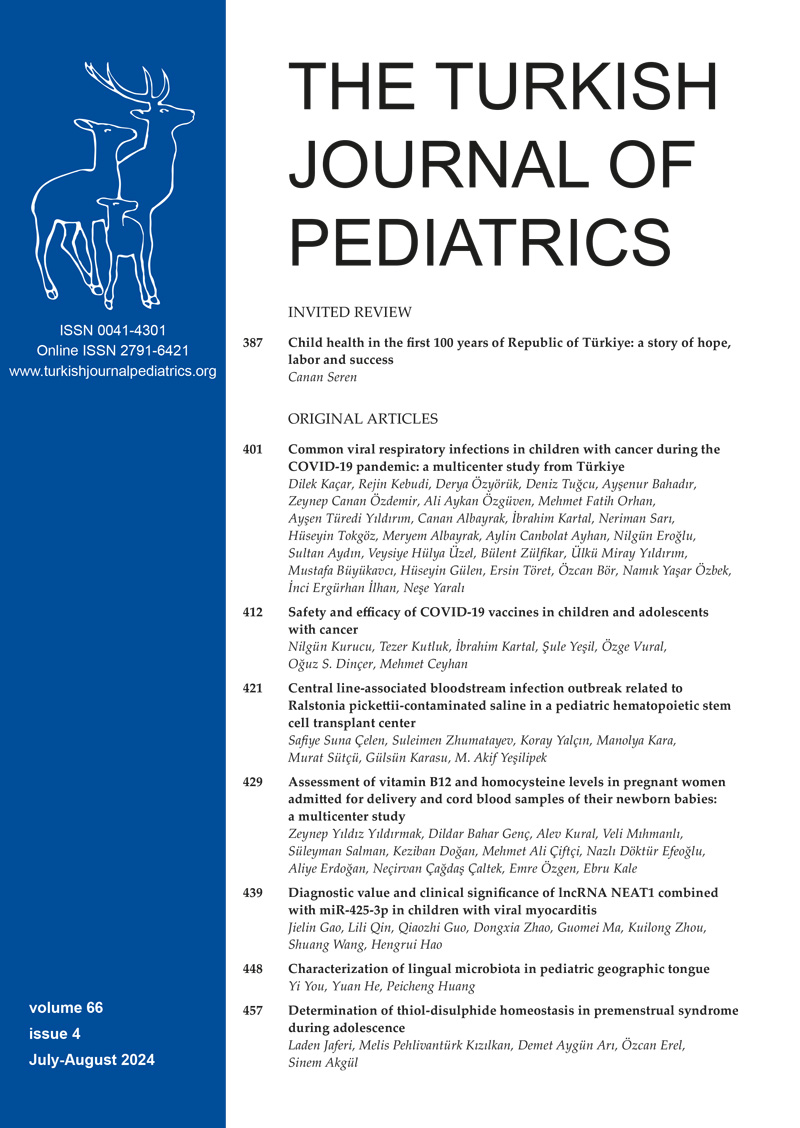Abstract
Background. ZFYVE19 mutation has been recently identified as one of the non-syndromic causes of cholestasis. It is associated with elevated gamma-glutamyl transferase levels and is likely a cause of neonatal-onset and intrahepatic cholestasis.
Case. Here, we report a rare case of ZFYVE19 defect, confirmed by whole exome sequencing (WES). Our patient, who is currently 4 years old, presented to us at the age of 2 years with elevated levels of serum transaminases and bilirubin. WES revealed a homozygous ZFYVE19 mutation despite preserved synthetic liver function. This gene has recently been identified in the literature as a cause of non-classical progressive familial intrahepatic cholestasis (OMIM # 619849). Treatment with an appropriate dose of ursodeoxycholic acid resulted in the regression of elevated liver enzymes and itching. The patient’s body mass index progressively increased throughout the treatment period. No medication side effects were observed at any point. Currently, the patient remains asymptomatic during follow-up.
Conclusion. We have identified the ZFYVE19 mutation as a variant that is not accompanied by any other symptoms. However, we have limited knowledge about the progression of the disease and are closely monitoring the patient for potential liver-related issues. Using WES in cases of undiagnosed liver enzyme elevations or cholestasis can help identify new genes and improve our understanding of the underlying pathophysiology.
Keywords: cholestasis, progressive familial intrahepatic cholestasis, ursodeoxycholic acid, whole exome sequencing
References
- Feldman AG, Sokol RJ. Neonatal cholestasis: updates on diagnostics, therapeutics, and prevention. Neoreviews 2021; 22: e819-e836. https://doi.org/10.1542/neo.22-12-e819
- Jacquemin E. Progressive familial intrahepatic cholestasis. Clin Res Hepatol Gastroenterol 2012; 36(Suppl 1): S26-S35. https://doi.org/10.1016/S2210-7401(12)70018-9
- Davit-Spraul A, Gonzales E, Baussan C, Jacquemin E. Progressive familial intrahepatic cholestasis. Orphanet J Rare Dis 2009; 4: 1. https://doi.org/10.1186/1750-1172-4-1
- Gwaltney C, Ivanescu C, Karlsson L, Warholic N, Kjems L, Horn P. Validation of the PRUCISION instruments in pediatric patients with progressive familial intrahepatic cholestasis. Adv Ther 2022; 39: 5105-5125. https://doi.org/10.1007/s12325-022-02262-7
- Fawaz R, Baumann U, Ekong U, et al. Guideline for the evaluation of cholestatic jaundice in infants: joint recommendations of the North American Society for Pediatric Gastroenterology, Hepatology, and Nutrition and the European Society for Pediatric Gastroenterology, Hepatology, and Nutrition. J Pediatr Gastroenterol Nutr 2017; 64: 154-168. https://doi.org/10.1097/MPG.0000000000001334
- Vinayagamoorthy V, Srivastava A, Sarma MS. Newer variants of progressive familial intrahepatic cholestasis. World J Hepatol 2021; 13: 2024-2038. https://doi.org/10.4254/wjh.v13.i12.2024
- Baker A, Kerkar N, Todorova L, Kamath BM, Houwen RHJ. Systematic review of progressive familial intrahepatic cholestasis. Clin Res Hepatol Gastroenterol 2019; 43: 20-36. https://doi.org/10.1016/j.clinre.2018.07.010
- Amirneni S, Haep N, Gad MA, Soto-Gutierrez A, Squires JE, Florentino RM. Molecular overview of progressive familial intrahepatic cholestasis. World J Gastroenterol 2020; 26: 7470-7484. https://doi.org/10.3748/wjg.v26.i47.7470
- Nigg EA, Holland AJ. Once and only once: mechanisms of centriole duplication and their deregulation in disease. Nat Rev Mol Cell Biol 2018; 19: 297-312. https://doi.org/10.1038/nrm.2017.127
- Luan W, Hao CZ, Li JQ, et al. Biallelic loss-of-function ZFYVE19 mutations are associated with congenital hepatic fibrosis, sclerosing cholangiopathy and high-GGT cholestasis. J Med Genet 2021; 58: 514-525. https://doi.org/10.1136/jmedgenet-2019-106706
- Pepe A, Colucci A, Carucci M, et al. Case report: add-on treatment with odevixibat in a new subtype of progressive familial intrahepatic cholestasis broadens the therapeutic horizon of genetic cholestasis. Front Pediatr 2023; 11: 1061535. https://doi.org/10.3389/fped.2023.1061535
- Ananth R. Neonatal cholestasis: a primer of selected etiologies. Pediatr Ann 2018; 47: e433-e439. https://doi.org/10.3928/19382359-20181018-01
- Mandato C, Siano MA, Nazzaro L, et al. A ZFYVE19 gene mutation associated with neonatal cholestasis and cilia dysfunction: case report with a novel pathogenic variant. Orphanet J Rare Dis 2021; 16: 179. https://doi.org/10.1186/s13023-021-01775-8
Copyright and license
Copyright © 2024 The Author(s). This is an open access article distributed under the Creative Commons Attribution License (CC BY), which permits unrestricted use, distribution, and reproduction in any medium or format, provided the original work is properly cited.















